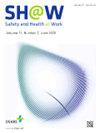Anti-masking Posts on Instagram: Content Analysis During the COVID-19 Pandemic
IF 2.9
3区 医学
Q1 PUBLIC, ENVIRONMENTAL & OCCUPATIONAL HEALTH
引用次数: 0
Abstract
Background
The SARS-CoV-2 viral outbreak has been conflicts with the past-tense narrative elsewhere in the abstract.; the infodemic. Misinformation about the virus and disease it causes (COVID-19) has been linked with authority-questioning beliefs, co-branding with conspiracies, and other misinformation across social media. Distrust in simple occupational and public health tools we have at our disposal (like well-fitting face masks) has proliferated. Despite attempts to curb the spread of untrue or misleading information on COVID-19, this messaging persists on social media.
Methods
Using a clean and cleared account, the 300 top posts under the hashtag #masksdontwork were collected on Instagram for thematic analysis over three weeks in June 2022, with three separate data collection dates. Themes contained in the posts were independently assessed by two coders and discrepancies were resolved by consensus.
Results
The most dominant theme among posts was mistrust, including “government lies” and “media lies.” Anti-masking rhetoric was the second most frequent theme, where “freedom” and “disbelief in data” were common sub-themes.
Conclusion
Science denial and propaganda shared among Instagram users may represent an onramp to consumption of broader conspiracy theories and government distrust, in addition to having negative health effects and social consequences for workers regardless of whether they wear masks. Social media algorithms promote similar misinformation or authority-questioning beliefs to users who view related content. Addressing the spread of health-related misinformation can assist in deconstructing myths and increasing trust in public health authorities and prevent the spread of communicable diseases among workers and the public.
Instagram上的反屏蔽帖子:COVID-19大流行期间的内容分析
SARS-CoV-2病毒爆发一直与其他地方的过去式叙述相冲突。infodemic。关于病毒及其引起的疾病(COVID-19)的错误信息与质疑权威的信仰、与阴谋联合宣传以及社交媒体上的其他错误信息有关。对我们手头上的简单职业和公共卫生工具(比如合身的口罩)的不信任已经激增。尽管试图遏制有关COVID-19的不真实或误导性信息的传播,但这种信息在社交媒体上仍然存在。方法使用一个干净的账户,在2022年6月的三周内收集Instagram上#masksdontwork标签下的300个热门帖子进行主题分析,其中有三个独立的数据收集日期。帖子中包含的主题由两名编码员独立评估,差异通过协商一致解决。结果微博中最主要的主题是不信任,包括“政府谎言”和“媒体谎言”。反掩蔽言论是第二常见的主题,“自由”和“不相信数据”是常见的副主题。在Instagram用户中分享的科学否认和宣传可能代表着更广泛的阴谋论和政府不信任的消费,除了对工人产生负面的健康影响和社会后果之外,无论他们是否戴口罩。社交媒体算法向浏览相关内容的用户推广类似的错误信息或质疑权威的信念。解决与健康有关的错误信息的传播问题,有助于消除误解,增加对公共卫生当局的信任,并防止传染病在工作人员和公众中传播。
本文章由计算机程序翻译,如有差异,请以英文原文为准。
求助全文
约1分钟内获得全文
求助全文
来源期刊

Safety and Health at Work
Social Sciences-Safety Research
CiteScore
6.40
自引率
5.70%
发文量
1080
审稿时长
38 days
期刊介绍:
Safety and Health at Work (SH@W) is an international, peer-reviewed, interdisciplinary journal published quarterly in English beginning in 2010. The journal is aimed at providing grounds for the exchange of ideas and data developed through research experience in the broad field of occupational health and safety. Articles may deal with scientific research to improve workers'' health and safety by eliminating occupational accidents and diseases, pursuing a better working life, and creating a safe and comfortable working environment. The journal focuses primarily on original articles across the whole scope of occupational health and safety, but also welcomes up-to-date review papers and short communications and commentaries on urgent issues and case studies on unique epidemiological survey, methods of accident investigation, and analysis. High priority will be given to articles on occupational epidemiology, medicine, hygiene, toxicology, nursing and health services, work safety, ergonomics, work organization, engineering of safety (mechanical, electrical, chemical, and construction), safety management and policy, and studies related to economic evaluation and its social policy and organizational aspects. Its abbreviated title is Saf Health Work.
 求助内容:
求助内容: 应助结果提醒方式:
应助结果提醒方式:


